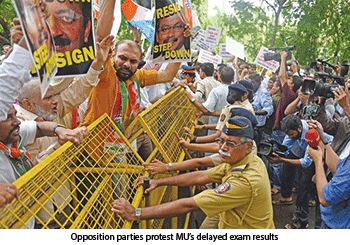 The initiative of the vintage but continuously parochialised University of Mumbai (MU, estb. 1857) to replace manual assessment of students’ examination papers with an online evaluation system has come a cropper with technological disruptions and tedious processes delaying results for most of the university’s undergrad and postgraduate students. The delay has impacted 425,000 students who wrote their exams 60-90 days ago in March.
The initiative of the vintage but continuously parochialised University of Mumbai (MU, estb. 1857) to replace manual assessment of students’ examination papers with an online evaluation system has come a cropper with technological disruptions and tedious processes delaying results for most of the university’s undergrad and postgraduate students. The delay has impacted 425,000 students who wrote their exams 60-90 days ago in March.
Protests against the delay in completing assessments have reached the Maharashtra governor C.V. Rao, ex officio chancellor of the university, who set July 31 as the deadline for declaration of all results. However, with the university’s administration unable to complete the formidable task of correcting 1.75 million answer scripts within the deadline and requesting an extension until August 5, the public outcry against the delay resonated within the state’s legislative assembly with academics, student unions and political parties demanding the resignation of vice chancellor Sanjay Deshmukh.
The Maharashtra Universities Act, 1994, requires universities to declare all results within 45 days of students writing an exam, a mandate MU has often failed to meet, blaming burgeoning student enrollment — 715,000 students in 778 affiliated colleges in 2017-18. Ironically, vice chancellor Deshmukh’s spirited January 24 announcement introducing the online assessment system for all courses this year onwards, promised speeding up the evaluation process by automating several time-consuming manual processes such as totaling marks and preparing mark-sheets.
However, plagued by its slow bureaucratic processes, the MU administration took five months (until May) to select the agency to implement the online assessment system, only after which scanning the answer scripts — the first step towards online evaluation — could commence. When by May 12 most of the answer-sheets were scanned and ready for assessment, only 400 of the 9,500 evaluators were available to assess the 1.75 million answer-sheets because the summer vacations had — not unexpectedly — begun.
“With evaluators needing some time to get used to the online assessment system, the number of papers evaluated also depended on the Internet speed at colleges designated as centralised assessment process (CAP) centres. Complaints of technical glitches resulting in poorly scanned papers, mixed-up or wrong subject answer sheets, server issues and poor connectivity have been cropping up even in the last leg of evaluation,” says a CAP coordinator speaking on condition of anonymity.
While the number of evaluators improved substantially after the academic year commenced in June, the MU administration resorted to desperate measures as the July 31 deadline drew near. The varsity administration urged college principals to mobilise and motivate faculty to report for assessment duty even during their weekly days off resulting in 5,396 evaluators assessing 30 answer booklets daily (161,880 answer sheets per day) and the number of CAP centres was increased from 100 to 255 by May 10. Through personal appeals, Deshmukh even roped in faculties of other state varsities including Nagpur University, Savitribai Phule Pune University and the Babasaheb Ambedkar Marathwada University, Aurangabad to aid and enable MU’s online assessment drive.
Despite this unprecedented effort, the university failed to meet the July 31 deadline and results of a mere 190 of the 477 exams written were declared until August 2 at the time of going to press. The varsity has promised to declare all pending results by August 5 but the news brings little relief to a large number of undergrads who have missed the deadline for admission into postgraduate programmes of several universities in India and abroad — the price of MU’s tardy planning and execution of its ambitious digital assessment system.
Students apart, even within wider civil society there’s little appreciation for the university administration’s massive resource mobilisation effort. Nor has its ill-planned decision to digitise the evaluation process been lauded. Bhalchandra Mungekar, former vice chancellor (2000-2004) of MU and Rajya Sabha member, demanded Deshmukh’s resignation on moral grounds for “placing the future of the outgoing batch of students in jeopardy”.
This contretemps has also turned into yet another flash point between the state’s ruling BJP and its coalition partner, the Shiv Sena, ironically also its fiercest critic. Aditya Thackeray, head of the Yuva Sena, the Sena’s youth wing, has written to the governor asking for the resignations of the vice chancellor and Vinod Tawde, minister of higher and technical education, even as Shiv Sena’s Ravindra Waikar is the state minister of higher and technical education.
Academics who have been witness to the steady decline of MU, believe that by promising to set up an enquiry committee and initiate appropriate action against MU officials, both Tawde and Waikar have effectively shrugged off their responsibility for the delay in declaration of exam results. Earlier, the state government had dismissed MU’s administrative and academic policy-making bodies including the senate, management council, academic council, board of studies and board of examination in anticipation of enactment of the Maharashtra Public Universities Act 2016. Meanwhile, ad-hoc appointments became the norm in MU until the Act was finally passed in the state’s assembly in March, 2016. Under the new Act, election for these academic councils will be held this month (August).
Dipta Joshi (Mumbai)


























